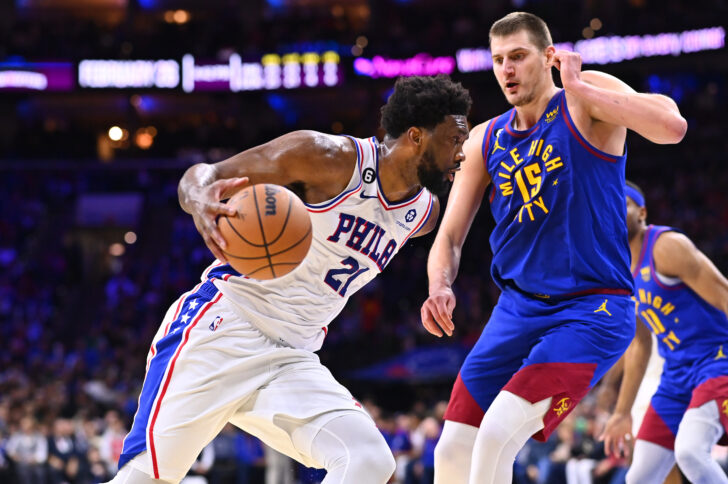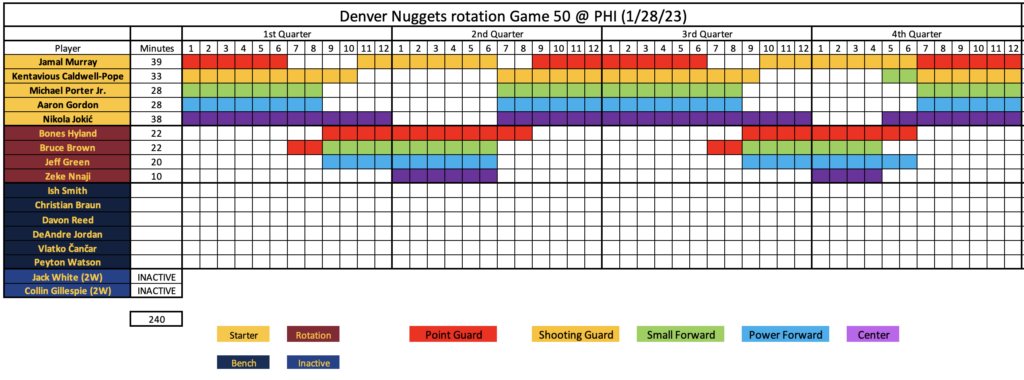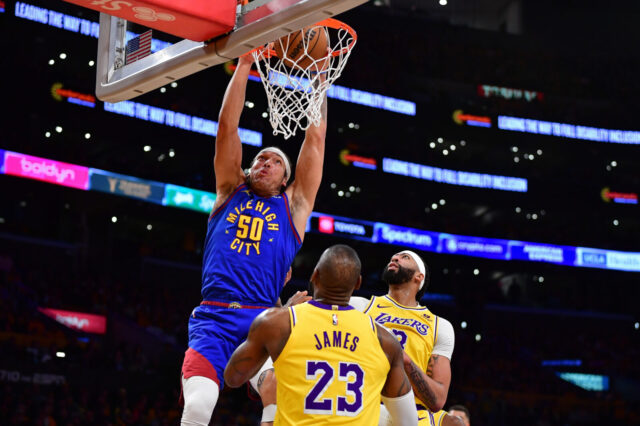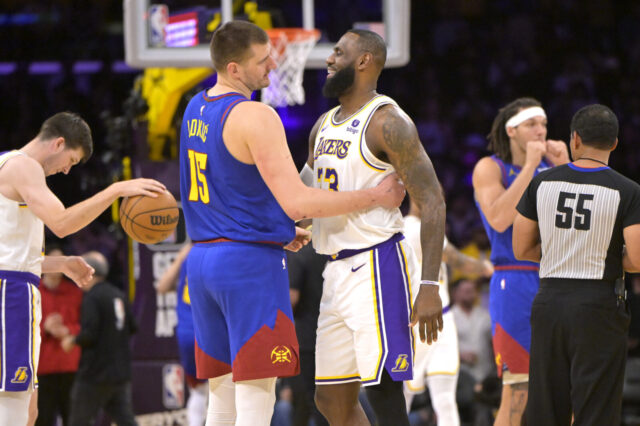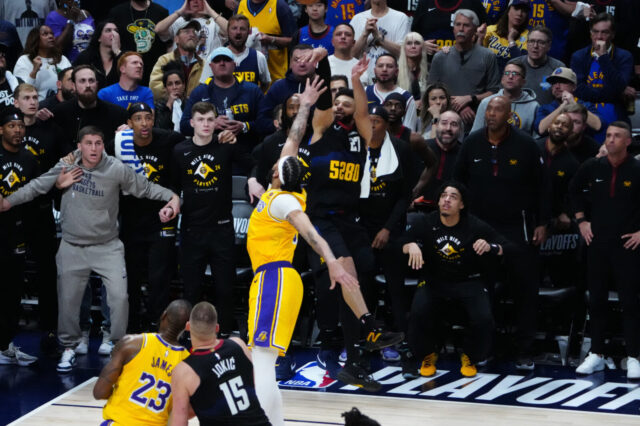The Philadelphia 76ers won 126-119 over the Denver Nuggets on national television on Saturday, highlighted by Joel Embiid’s domination.
The Nuggets jumped out to a 73-58 lead at halftime with Nikola Jokić outplaying Embiid in his do-everything role. The second half completely flipped the script though with Embiid scoring 28 of his 47 points and leading the Sixers to a major comeback. Embiid was hitting mid-range jumpers, stepback threes, and even got past Jokić for an emphatic reverse dunk.
https://t.co/7aRABO9LxZ pic.twitter.com/vcLghi1VHl
— Philadelphia 76ers (@sixers) January 28, 2023
On the other end, the Nuggets scored just 46 points in the second half with Jokić putting up eight. He attempted just five shots and appeared bothered by the hounding, physical defense of PJ Tucker, passing out of shot attempts and rarely getting comfortable. The Nuggets shot 4-of-17 from three-point range in the second half after putting up a scorching 10-of-17 in the first half. It simply wasn’t meant to be with the momentum the Sixers had generated from getting stops and getting emphatic baskets to match.
Embiid won his battle with Jokić emphatically, and the Sixers’ comeback says a lot about both Philly and Denver at this stage.
Here are my primary takeaways from the Nuggets’ rivalry week matchup against the Sixers:
Styles make fights, and Embiid’s style won out
Much has been made of the different ways Jokić and Embiid approach the game from the center position. In the first half, it appeared that Jokić’s calmer, more passive and opportunistic approach was the right call. The Nuggets were playing team basketball, and even though Embiid had 19 points on 17 shots, they were comfortably ahead at half.
After the break though, Embiid focused in and went to work, avoiding attempts to draw fouls and instead getting to his spots. Jokić struggled to contest him on the perimeter, and Embiid’s jumper was hotter than lava. On the other end, Jokić attempted just five shots in the second half as the Nuggets ran their motion offense around him, trying to cut and create open shots but finding limited success. Murray clanged some jumpers, and Porter was cold after a hot first half, but the real culprit was Jokić with six second half turnovers.
Embiid was put into a position to isolate against Jokić for much of the second half, and he had a lot of success with that. Jokić didn’t seem comfortable doing the same to PJ Tucker, which brings us to…
Switching power forwards onto Jokić is a problem for the Nuggets
During the second half, the Sixers switched their big man matchups. Embiid had been guarding Jokić, but the Sixers decided to put Tucker on him and Embiid on Aaron Gordon. Embiid then served as a roamer for much of the second half, trying to much up every action and recover back to Gordon in time to contest shots at the rim. Gordon had 7 points on 3-of-4 from the field in the second half, but the key was just the four attempts. The Sixers knew they could live with that.
In the on-ball matchup though, Jokić rarely challenged PJ Tucker in the post. The few opportunities he did, Tucker got the better of him, stripping the ball, bumping Jokić off his spot, and playing an extremely physical brand of post defense. Michael Malone was assessed a technical foul in the third quarter while complaining to the refs about the level of physicality allowed. Tucker did a great job of walking the line, and that decision by Doc Rivers and the Sixers coaching staff completely flipped the game.
On the whole, the matchup bothered Jokić, and it’s not the first time. Earlier this year, Kyle Anderson did the same thing, switching onto Jokić while being flanked by Rudy Gobert and Naz Reid. The Memphis Grizzlies and Boston Celtics have done similar things with Steven Adams and Al Horford/Grant Williams guarding Jokić while Jaren Jackson Jr. and Robert Williams help from the weak side.
It’s a concept the Nuggets have yet to crack consistently. Gordon wants to hang around the dunker spot to take advantage of help defense, but that drags a defender into the paint. When Gordon spaces to the corner, opposing teams will often leave him open, and Gordon will have to make threes in that situation. It mucks up the game and Denver’s consistent movement/flow, and the Nuggets will have to have a more consistent answer when the playoffs arrive.
Denver’s bench is too shaky to be the NBA title favorite
Today’s matchup is a great example of what happens when the Nuggets starters get outplayed. The first half was way better than the second half for Denver, but overall, the starters lost the thread of the game. That happens sometimes.
But for a team that always staggers one or two of those starters with the second unit, the bench can’t be as shaky as it was today. Jamal Murray wasn’t at his best, and though he had some great moments in the first half, he was 2-of-7 in the second half and just didn’t impact the overall game enough in his minutes. He will have to be better.
But the four bench guys that the Nuggets put on the floor – Bones Hyland, Bruce Brown, Jeff Green, and Zeke Nnaji – simply should be better than they were today. It’s an intense road game to be clear, and both Hyland and Nnaji are young, but the Nuggets just didn’t get any change-of-pace from the bench in the second half. Hyland made just one of his five three-pointers attempted, Brown fouled multiple three-point shooters today including Embiid on a three-quarter court heave, and Green was simply horrible defensively.
The Nuggets didn’t have a way to stop the bleeding in the second half. If the Nuggets run into a playoff matchup where Jokić and the starters aren’t constantly winning their minutes, then an inopportune 10-2 bench run is simply going to lose the Nuggets a series.
Christian Braun and Vlatko Čančar didn’t play. Perhaps they deserve an opportunity rather than scouring the trade market; however, it’s clear that there’s something missing from Denver’s bench to feel completely comfortably entering championship season.
